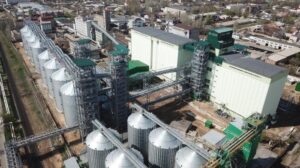
South Korean corporation POSCO International plans to resume full operation of its grain terminal in Mykolaiv region, according to a press release from the Ministry of Economy, Environment, and Agriculture following a meeting between Minister Oleksiy Sobolev and business representatives during a working trip to Odesa.
The ministry specified that the meeting discussed the prospects for developing infrastructure for storing grain and vegetable products (storage facilities and cold rooms).
“The Ukrainian side emphasized the need to develop mechanisms to protect businesses in wartime and reduce the cost of marine insurance. At the same time, the government is working on a program to support the restoration of trade routes in the Mykolaiv region,” the statement said.
The Korean delegation, consisting of POSCO International Corporation Vice President Kim Young-hoon and POSCO International Ukraine Sales Director An Suk-hyun, noted the Ukrainian government’s cooperation with the Economic Development and Cooperation Fund (EDCF). Through the EDCF and KEXIM Bank programs, Korean companies have the opportunity to participate in the transformational reconstruction of Ukraine. This includes POSCO, which has experience in implementing infrastructure projects abroad.
One of the company’s priorities is the construction of an RDF-fueled (Refuse-derived fuel) thermal power plant in Odesa. Consultations with the city administration on environmental and energy efficiency issues have already been held. The project to build a CHP plant in Odesa has been tentatively included in the list of priorities.
“The project in Odesa is very important for our ministry because it combines an investment component with an environmental component. The initiative is aimed at protecting the environment and introducing modern technologies to reduce emissions. In the future, this practice can be extended to other regions of Ukraine. The Agency for Reconstruction is submitting this project to the Unified Project Portfolio of the State, and it is expected to be evaluated by experts and subsequently approved by the Strategic Investment Council,” Sobolev said.
Regarding the implementation of a joint project with JSC Ukrzaliznytsia – the construction of a railway depot – various mechanisms for attracting investment are currently being considered, in particular, public procurement and public-private partnership instruments. The first option opens up more opportunities for Korean companies to participate in Ukraine’s recovery, while the second option allows for the localization and involvement of Ukrainian manufacturers in the project as part of the “Made in Ukraine” state policy aimed at stimulating the development of national production.
GRAIN TERMINAL, MYKOLAIV REGION, ODESA, POSCO International, TPP
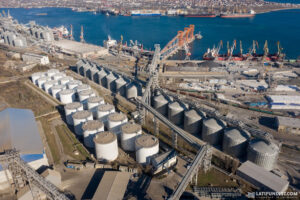
The Epicenter group of companies and the family of People’s Deputy Anatoly Urbansky intend to build a grain terminal in the port of Pivdennyi (Odesa region) with a transshipment capacity of 5 million tons of grain cargo per year at an estimated cost of $160-270 million, according to latifundist.com. The first announcement about the future terminal was made in November 2024 by Petro Mikhailishin, CEO of Epicenter K. In April 2025, the information was confirmed by Svitlana Nikitiuk, head of the group’s agricultural division.
The publication claims that the terminal construction project is not just a business plan. In 2025, Casablanca Shipping Limited (Cyprus), founded by Epicenter K, acquired a 32.61% stake in Promtechnizatsiya (Odesa).
The remaining 16.48% of the legal entity’s shares belong to Anatoliy Urbansky, and 25.46% each to Kateryna and Denys Urbansky. Promtechnizatsiya leases land plots in the water area of the Pivdennyi port and near the local highway T1606.
The total area of the plots for construction is about 32 hectares. This area is sufficient for the construction of a station for unloading railcars and motor vehicles near the highway, after which the grain will be sent through a transport gallery to silos and a transshipment terminal.
According to the publication, the construction of the terminal is still at the design stage, which was developed in 2024. Its estimated cargo turnover is 5 million tons per year, and the total capacity of the silo warehouses is 250,000 tons.
According to the project, a private railway station with a capacity of up to 3 million tons per year and the ability to handle up to five freight trains (50-70 cars) per day will be built to unload cars. The land plot for the railway station is 10 hectares. A wagon unloading station with a capacity of 2,000 tons per hour and a truck unloading station with a capacity of 1,000 tons per hour are planned for the facility.
The unloading station with main elevators will be connected by a 1,600 m long conveyor gallery with a capacity of 1,200 tons per hour. From there, the grain will be transported to silos: about 50 “banks” with a total capacity of 250,000 tons are planned, located on a 10-hectare site.
There are plans to build a berth up to 350 m long and 16 m deep. Agricultural products will be transshipped by two tower cranes with a capacity of 1,500 tons per hour. The equipment for unloading, transporting, storing, and transshipping grain is owned by Promtehinovatsiya.
According to port officials familiar with the construction progress, the project is being implemented successfully. The terminal is scheduled to be launched in 2026. Despite the technical complexity of the project, the publication’s interlocutors are optimistic about the prospects for the timely completion of construction. At the same time, market participants are reluctant to estimate the payback period of the project.
Epicenter K LLC, which includes Epicenter Agro, was established in 2003 and opened its first hypermarket in Kyiv in December of the same year. It has a network of shopping centers of the same name in Ukraine. Since 2016, it has been developing its agricultural business. It cultivates over 1,670,000 hectares in the Vinnytsia, Khmelnytskyi, Ternopil, Zhytomyr, Cherkasy, and Kyiv regions. The group includes 20 livestock farms and 15 elevator complexes with a total storage capacity of 2 million tons.
The agricultural holding’s own production of agricultural products is about 1 million tons. In 2025, Epicenter Agro launched its own trading business. Anatoliy Urbansky is a member of parliament, a member of the For the Future parliamentary group, and a member of the parliamentary committee on finance, tax, and customs policy.
Since 2005, he has been engaged in entrepreneurial activities in ship repair companies. Since 2009, he has been a manager for management and administrative activities and a consultant for ship repair and maintenance at Dunaysudoremont JSC. In 2011, he was elected a member of the supervisory boards of PJSC Dunaysudoremont and PJSC Izmail River Port Dunaysudorservis. In 2015, he was elected a member of the Odesa Regional Council.
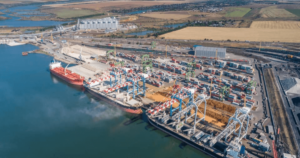
At URC-2025, SCM Group’s Intech investment company umgi has presented a project to build a grain terminal in Pivdennyi port with a planned annual transshipment capacity of 9 million tons and the ability to receive Post-Panamax vessels at its own berths. According to the press release, the estimated cost of the project is $200 million.
“We are pleased to join the recovery process. One of umgi’s initiatives was included in the Catalog of Investment Projects presented at the Ukraine Recovery Conference 2025 in Rome,” the company said in a statement.
It is specified that due to its strategic location and efficient infrastructure, such a terminal will play a key role in the export of Ukrainian agricultural products. This is a unique opportunity to invest in Ukraine’s strategic infrastructure, expand grain transportation capacity, and strengthen the country’s role in global trade.
Overall, the investment potential of key sectors of the Ukrainian economy over the next decade exceeds $300 billion. This figure includes rebuilding the destroyed sectors, transforming the economy and building a stable and environmentally friendly future. Realizing this potential will create a demand for equipment worth EUR33.8 billion annually in Ukraine.
A catalog with 250 current projects can be found here: https://kse.ua/…/07/Investment-catalog-Ukraine-2025.pdf
umgi is an investment company focused on the development of businesses in the raw materials and processing industries. It was founded in 2006 by SCM Group. Investment focus: mining; by-product and waste management; production of industrial goods and services. The total value of the portfolio companies is estimated at over $500 million.
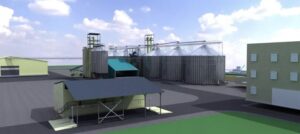
In Nikolaev region is planned to build a river grain terminal with a transshipment capacity of 10 thousand tons of grain per day, according to the website Dream.Projects of the Ministry of Development of Communities and Territories (Ministries of Communities and Territories).
“The terminal will provide grain reception by both road and rail transport with subsequent shipment to barges of the “River-More” class and bulk carriers of the Panamax class,” reads the description of the project submitted by the Voznesenska territorial community.
The terminal will have two lines for receiving grain from cars equipped with automatic unloaders, as well as a line for receiving grain from railroad cars. The facility will be equipped with two grain cleaning machines and two continuous shaft-type grain dryers for processing raw materials. Metal silos, with which the terminal will be equipped, will allow simultaneous storage of up to 40 thousand tons of grain, which will allow efficient formation of shipment batches.
It is planned to install transport systems with the capacity of 300-500 tons per hour at the terminal, which will ensure uninterrupted and timely shipment of grain to ships.
The approximate duration of construction of the facility is 24 months.

The first grain port in Poland will be built in Gdansk, in particular for the export of Ukrainian agricultural products, Minister of Agriculture and Rural Development Robert Telus said at a meeting with voters in Przysus, polskieradio24.pl reports.
According to the report, RSSI (Agri-Food Investment Company – IF-U) has signed an agreement with the Port of Gdansk to implement this project.
“On Tuesday, the state budget enterprise RSSI signed an agreement with the Port of Gdansk to create a grain port. We have a grain port,” the minister said, adding that this is an extremely important event.
He noted that the grain port will improve the transportation of grain, in particular from Ukraine.
The creation of further “solidarity corridors” that would allow the transportation of Ukrainian grain by sea is very important, he explained, while emphasizing that the lack of agricultural supplies to African countries is beneficial to Russian President Vladimir Putin.
As reported, on September 15, the European Commission announced that it would not extend restrictions on imports of agricultural products from Ukraine to five neighboring EU countries (Poland, Bulgaria, Hungary, Romania and Slovakia) under certain conditions that will help avoid a new sharp increase in supplies.
The restrictions were introduced on May 2 and applied to imports of wheat, rapeseed, sunflower and corn. These five Eastern European EU member states argued that Ukrainian agricultural products, when imported duty-free into the EU, were being deposited in their countries and were harming their local agricultural sectors.
After the restrictions were lifted, Poland, Hungary, and Slovakia imposed unilateral bans. Poland expanded the list of banned products to include rapeseed cake and meal, as well as corn bran, wheat flour, and derivatives. Hungary extended the list to 24 commodity items.
Ukraine filed a lawsuit with the WTO, accusing Poland, Hungary, and Slovakia of discriminatory treatment of its agricultural products.
Ukraine is currently negotiating the introduction of a mechanism for licensing the export of Ukrainian agricultural products with mandatory verification in each of the five countries.
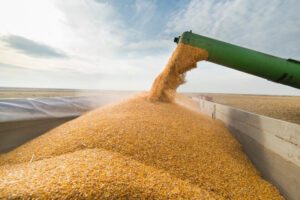
KMZ Industries (Karlovskiy Machine Building Plant, KMZ, Poltava region) at the end of 2022 has manufactured and delivered the equipment necessary for the completion of construction of the “dry” port of Alebor Group located on the territory of Hlybotskiy community (Chernivtsi region) near the border with Romania.
According to the Facebook page of the engineering company, KMZ is ordering construction of the first stage of the export grain terminal with a capacity of 30 000 tons and loading capacity of 300 tons per hour.
Altogether Alebor Group is planning several stages of terminal construction for 2023-2024. In the long term, the “Vadul-Siret Terminal” project will transship Ukrainian agricultural products into narrow gauge railroad wagons for subsequent shipment to the Romanian port of Constanta, thus giving exporters an alternative to Ukrainian sea ports.
As reported, the head of Hlybock community Gregory Vanzuryak in August 2022, wrote that the facility will be equipped with silos up to 200 thousand tons and a capacity of handling up to 3 million tons / year.
He said the first phase of the $20 million project, which will be completed in January 2023, will store up to 60,000 tons of crops and transship up to 1.2 million tons of grain annually to Romania.
Vanzuryak noted that the total construction cost of the facility will be $40 million.
Alebor Group in July-2022 announced the purchase of land for the construction of a terminal for transshipment of crops from the wide Ukrainian railroad track to the narrow European railroad track, as well as an elevator with a total capacity of 60 thousand hectares.
Alebor Group was founded in 2014. Its founder is entrepreneur Alexey Kustov.
In addition to Voronivtsi KPP, the group includes Krystyniv KPP (Cherkasy region) and KPP Chestne (Odessa region), as well as trucking companies Boleko (Cherkasy region), Autoera (Odessa region) and a trading division. The total fleet of the companies amounts to 210 grain carriers.
Before the full-scale Russian invasion into Ukraine, the group of companies had the capacity to export 1.2 million tons of grains and oilseeds per year. The total capacity of the three elevators is 315 thousand tons of simultaneous storage.
KMZ Industries produces flat-bottom and cone-bottom silos, flour storage silos, Brice-Baker mine dryers (British design) and chipboards (Ukrainian design), transport equipment (elevator, chain, belt and screw conveyors), separators for grain cleaning, installs and automates elevator equipment and technological processes in grain storages.
In 2020 the plant increased revenue by 35% to 395.26 million hryvnias and made 5.05 million hryvnias of net profit against a loss of 25.37 million hryvnias. In 2021, it planned to increase production by 30-50%.
As of the fourth quarter of 2021, Dragon Capital Investments Limited (Cyprus), whose ultimate beneficiary is Tomas Fiala, owns 80% of KMZ JSC shares, while Variant Agro Bud LLC holds 20%.